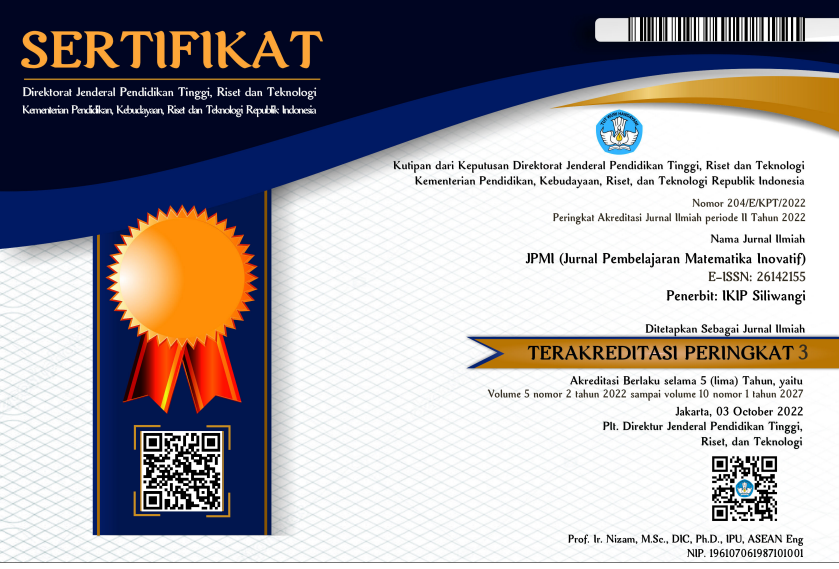ANALISIS KEMAMPUAN KONEKSI MATEMATIK SISWA MTS DITINJAU DARI SELF REGULATED LEARNING
DOI:
https://doi.org/10.22460/jpmi.v1i4.p657-666Keywords:
Mathematical Connection, Self Regulated Learning, Analysis Error.Abstract
This study aims to describe the extent to which the mathematical connection ability of students who viewed from Self Regulated Learning seen from students' mistakes in solving a problem of mathematical connection ability. The subject of this study students Classes VIIIA MTs AL-Hikmah Talegong Garut II as many as 20 students. The method used in this research is a descriptive method with quantitative approach. The research stage consisted of 4 stages, among others: self-regulated learning questionnaires, tests of mathematical connection ability, data analysis and draw conclusions. The results of the research were obtained that 1) Students who have high learning independence make mistakes on inter-topic relationships in mathematics and apply/use mathematics in other fields or in everyday life, 2) Students who have learning independence are making mistakes in understanding relationships between topics in mathematics as well as in identifying processes or procedures in carrying out basic concepts, 3) Students have low self-reliance to make mistakes in understanding the relationship of mathematics in other fields of science or in everyday life. Based on the results of the study can be concluded that the better the students' independence in learning then the smaller make a mistake in solve the problem of mathematical connection capabilities.
References
Amaliyah. (2017). REPRESENTASI MATEMATIS SISWA DALAM PEMECAHAN MASALAH MATEMATIKA NON RUTIN DITINJAU DARI PERBEDAAN GENDER. Jurnal Pendidikan MIPA, 7(2), 96.
Aripin. (2015). MENINGKATKAN KEMAMPUAN PEMAHAMAN MATEMATIK SISWA SMP MELALUI PENDEKATAN PEMBELAJARAN BERBASIS MASALAH. Jurnal Ilmiah UPT P2M STKIP Siliwangi, 2(1), 121.
Astuti. (2014). PENGARUH KEMAMPUAN KONEKSI MATEMATIKA MELALUI PEMBELAJARAN BERBASIS MASALAH. Prosiding Seminar Nasional Pendidikan Matematika ProgramPasca Sarjana STKIP Siliwangi Bandung, 1, 162.
Hendriana, H., & Rohaeti, E. E. (2017). Hard Skill dan Soft Skill Matematika Siswa. Bandung: Refika Aditama.
Hendriana, H. (2014). Penilaian Pembelajaran Matematika. Cimahi: Refika Aditama.
Hidayat, W., & Sumarmo, U. (2013). Kemampuan Komunikasi dan Berpikir Logis Matematika serta Kemandirian Belajar. dalam Jurnal Delta-fi, 2(1).
Isnaeni, S., Fajriyah, L., Risky, E. S., Purwasih, R., & Hidayat, W. (2018). Analisis Kemampuan Penalaran Matematis dan kemandirian Belajar Siswa SMP Pada Materi Persamaan Garis Lurus. Journal of Medives, 2(1), 107–115.
Kumalasari, A., Oktora, R., & Eka, P. (2013). P – 2, (November), 978–979.
Latipah, E. (2010). Strategi Self Regulated Learning dan Prestasi Belajar : Jurnal Psikologi, 37(1), 110–129. https://doi.org/10.22146/JPSI.7696
Lb, L. B. M., Negoro, R. A., Susanto, H., & Rusilowati, A. (2017). MEDIA, 6(2).
Lestari, K. E. (2014). Implementasi Brain-Based Learning untuk Meningkatkan Kemamouan Koneksi dan Kemampuan Berpikir Kritis serta Motivasi Belajar Siswa SMP. Jurnal Pendidikan UNSIKA, 2(1), 36–46.
Muchlis, A., Komara, E. S., Kartiwi, W., Nurhayati, N., Hendriana, H., & Hidayat, W. (2018). MENINGKATKAN KONEKSI MATEMATIS SISWA SMP MELALUI PENDEKATAN OPEN-ENDED DENGAN SETTING KOOPERATIF TIPE NHT. KALAMATIKA Jurnal Pendidikan Matematika, 3(1), 81-92.
Rijal, S., & Bachtiar, S. (2015). Hubungan antara Sikap , Kemandirian Belajar , dan Gaya Belajar dengan Hasil Belajar Kognitif Siswa, 3(2), 15–20.
Ruspiani. (2001). Kemampuan Siswa dalam Melakukan Koneksi Matematik.
Siagian, M. D. (2016). Pengaruh Penerapan Pendekatan Kemampuan Koneksi Matematik Dalam Pembelajaran Matematika. Journal Of Mathematics Educations and Science, 2(1), 58–67.
Sudirman. (2017). ANALISIS KEMAMPUAN KONEKSI MATEMATIS SISWA SMP PESISIR DITINJAU DARI PERBEDAAN GENDER. Seminar Nasional Riset Kuantitatif Terapan 2017.
Suherman. (2008). Diklat Perkuliahan Evaluasi Pembelajaran Matematika. Bandung.
Susila, I. (2015). Pendeketan Kualitatif Untuk Riset Pemasaran dan Pengukuran Kinerja Bisnis. BENEFIT Jurnal Manajemen Dan Bisnis, 19, 12–23.
Wahyu, H. (2014). THE IMPLEMENTATION OF MEAs INSTRUCTION TO STUDENTS’MATHEMATICS PROBLEM SOLVING AND CONNECTING ABILITY. In Proceeding of International Conference On Research, Implementation And Education Of Mathematics And Sciences 2014. Yogyakarta State University.
Z Ainurrizqiyah , Mulyono, H. S. (2015). Keefektifan Model Pjbl Dengan Tugas Creative Mind- Map Untuk Meningkatkan Koneksi Matematik Siswa, 4(2).

















